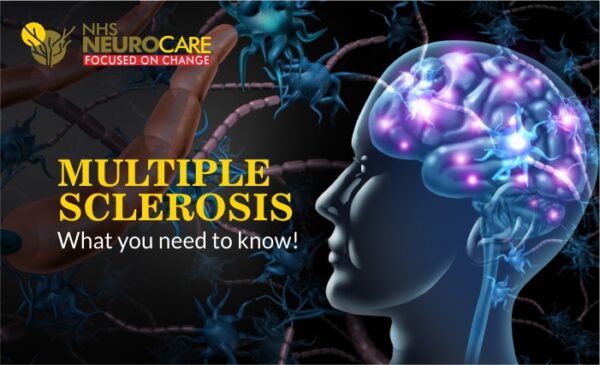Multiple Sclerosis: What You Need To Know Overview
Multiple sclerosis (MS) is an inflammatory demyelinating disease of the CNS in which activated immune cells invade the central nervous system and cause inflammation, neurodegeneration, and tissue damage. The underlying cause is currently unknown. The resulting damage to myelin, the protective layer insulating wire-like nerve fibres, disrupts signals to and from the brain. Recent research indicates that people with MS may live an average of about seven years less than the general population because of disease complications or other medical conditions.
WHAT IS MS
MS is thought to be an immune-mediated disease in which the body’s immune system attacks myelin, the fatty substance that surrounds and protects the nerve fibres of the central nervous system. Often the nerve fiber is also damaged.
TYPES OF MS AND STAGES
There are four types of multiple sclerosis:
- Clinically isolated syndrome (CIS): When someone has a first episode of MS symptoms, healthcare providers often categorize it as CIS. Not everyone who has CIS goes on to develop multiple sclerosis.
- Relapsing-remitting MS (RRMS): This is the most common form of multiple sclerosis. People with RRMS have flare-ups, also called relapse or exacerbation, of new or worsening symptoms. Periods of remission follow (when symptoms stabilize or go away).
- Primary progressive MS (PPMS): People diagnosed with PPMS have symptoms that slowly and gradually worsen without any periods of relapse or remission.
- Secondary progressive MS (SPMS): In many cases, people originally diagnosed with RRMS eventually progress to SPMS. With secondary-progressive multiple sclerosis, you continue to accumulate nerve damage. Your symptoms progressively worsen. While you may still experience some relapses or flares (when symptoms increase), you no longer have periods of remission afterward (when symptoms stabilize or go away).
EARLY SIGNS & SYMPTOMS
- Fatigue is one of the most common symptoms of multiple sclerosis.
- Vision problems- such as optic neuritis (blurriness and pain in one eye) are often one of the first signs of multiple sclerosis
- People may develop muscle weakness due to lack of use or stimulation due to nerve damage.
- A pins type sensation is felt which can affect the face, body, arms, and legs.
- Tremor, lack of coordination or unsteady gait
- Damage to nerve fibers in the spinal cord and brain can cause painful muscle spasms, including in the legs.
- Problems with bladder, bowel, sexual function or mood (particularly depression and anxiety)
- reduced activity, and loss of mobility. These can impact a person’s work and social life.
- Blurry vision
- Double vision
CAUSES AND RISK FACTORS
There’s no such cause but some reports suggest that viral infection caused by virus such as Epstein barr virus could trigger the disease whereas sunlight could strengthen immune system and lower the risk of multiple sclerosis.
Risk factors include:
- Age: It occurs between 15-55
- Sex: females are more predilected than males
- Family history: if the disease is followed in family the risk is higher.
- Certain infections: viral infections caused by Epstein barr virus
- Smoking
- Obesity
- Vitamin D: Having low levels of vitamin D and low exposure to sunlight is associated with a greater risk of MS.
- Certain autoimmune diseases.
MULTIPLE SCLEROSIS DIAGNOSIS
- Medical imaging, particularly MRI (magnetic resonance imaging), helps to clarify the diagnosis
- Tests (called evoked potentials) that measure the electrical activity in your brain.
MULTIPLE SCLERROSIS SPECIALISTS
They are primarily Neurologists who have an understanding of diseases that involve your nervous system. There are nurse practicioners and physical assistants to help along with them. In addition to them, there is a MULTIPLE SCLEROSIS SPECIALIST who takes extra care of your condition, care for your emotional health and rehabilitation and provide you information about alternative medicines.
MULTIPLE SCLEROSIS TREATMENT
- Certain drugs may reduce the risk of multiple sclerosis. They are as follows:
- Intravenous corticosteroids, such as methylprednisolone, is the usual therapy
- Siponimod and Cladribine
- Cognitive behavioral therapy is moderately effective for reducing MS fatigue
- Physical therapy including vibration interventions, electrical stimulation, exercise therapy, standing therapy, and radial shock wave therapy (RSWT), were beneficial for limiting spasticity, helping limit excitability, or increasing range of motion
- Yoga, Cannabis, Hyperbaric Oxygen therapy, Self-infection with Hookworms, Reflexology, Acupuncture, and Mindfulness.
The best consultation and the Multiple Sclerosis Treatment could be provided at NHS Neuro Care , as they provide specialized neurological care and solutions and personalized approach and care. Their aim is to improve the health of the community and the world by setting the standard of excellence in medical education, research and clinical care. The specialists focuses on the advanced, latest procedures & programs to achieve excellence in neurological care to provide their best towards their patients.


Wow, this blogger is seriously impressive!
I appreciate your creativity and the effort you put into every post. Keep up the great work!